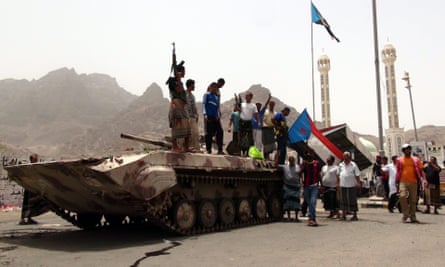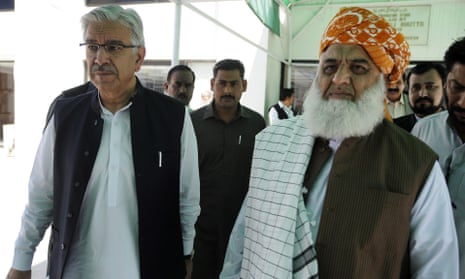Pakistan’s parliament has dealt a blow to Saudi hopes of defeating Yemen’s Houthi rebels, with MPs voting overwhelmingly for the country to remain out of the conflict.
Friday’s vote, which came as tensions continued to rise between Riyadh and Tehran over the conflict in Yemen, will make it extremely hard for the prime minister, Nawaz Sharif, to offer anything more than symbolic help.
Saudi Arabia, a prized ally and generous donor to Pakistan, had called on Islamabad to provide warships, aircraft and even ground troops. Last month Riyadh embarrassed Pakistan’s government by claiming it had already “expressed desire” to participate in the operation.
MPs shot the plan down on Friday, however, passing a resolution saying that “Pakistan should maintain neutrality in the Yemen conflict”.
It followed a week of debate in which politicians from across the spectrum called for the country not to become embroiled in what many regard as an overseas civil war.
Instead the resolution said Pakistan should play a mediating role, though it also promisese to “stand shoulder to shoulder” with Saudi Arabia in the event of an invasion or any threat to Islam’s holiest sites in Mecca and Medina – at present an unlikely scenario.
The national assembly’s decision came as the first plane carrying medical supplies form the International Committee of the Red Cross landed in Yemen’s capital, Sana’a.
Saudi fighter jets continued to bomb a number of targets close to the city, including the airforce headquarters, and in the south of the country near the port city of Aden, which has been the scene of heavy street fighting.
Pakistani opponents of military action argued that the country was already busy with major operations against its own Islamist rebels, including the Pakistani Taliban, and could not afford to get ensnared in Yemen.
With the struggle pitting a Saudi-led coalition of Sunni-majority countries against the Shia Houthi rebels, many also feared Pakistan’s involvement could make sectarian tensions inside the country worse.
In recent years there has been an increase in attacks by militant Sunni supremacists against Pakistan’s minority Shia population, including devastating bombings of neighbourhoods and places of worship.
A third factor making military action unpalatable to Islamabad is its need to maintain relations with its gas-rich neighbour Iran, which it hopes will help relieve chronic energy shortages should international sanctions against Iran be loosened.
On a two-day visit to Islamabad this week, the Iranian foreign minister, Mohammad Javad Zarif, lobbied the country’s top decision makers, including Sharif and Pakistan’s military chief, Raheel Sharif.
Pakistan is torn by the need to remain on good terms with both Iran and Saudi Arabia, a country held in particularly high esteem by Sharif after it sheltered him following the 1999 military coup that ousted him from power.

Riyadh has also been a generous patron, handing Pakistan $1.5bn (£1bn) last year to help it shore up its foreign exchange reserves and launch large energy projects.
Saudi Arabia and its Sunni Arab allies see Iran as part of the problem in Yemen, accusing Tehran of meddling by sending arms and money to the Houthi rebels, who belong to the Zaydi sect of Shia Islam, a charge Iran vehemently denies.
Riyadh says its involvement in Yemen is simply to support what it and the west see as the country’s legitimate president, Abd-Rabbu Mansour Hadi, who fled to the Saudi capital last month.
Tehran and Riyadh have both stepped up their rhetoric, accusing each other of inflaming the conflict.
On Thursday, Iran’s supreme leader, Ayatollah Ali Khamenei, in his strongest condemnation yet, accused Saudi Arabia of committing genocide in Yemen and warned that its military intervention would ultimately backfire. “Saudis are making a mistake, setting a bad precedent in the region,” he said.
There are increasing fears in the Middle East that the fighting in Yemen might spiral out of control, with deeper Saudi involvement provoking Tehran to follow suit, leading to a full-scale proxy war of an even more sectarian nature.
At least 643 people, including children, have died and thousands have been wounded since the violence erupted in Yemen last year, and especially since the Saudis launched air strikes last month.
On Thursday alone, at least 20 Houthi rebels were killed in southern Yemen in eight dawn air raids by Saudi fighter jets.
According to the Saudi newspaper Arab News, the Saudi air force is using its new UK Typhoon jets for the first time in the Yemen campaign. The air force has received 24 out of 72 Typhoon jets it ordered from the UK at a cost of $8bn (£5.47bn). Typhoons are generally equipped with 13 rockets as well as cruise missiles and anti-ground defence systems.
Figures from the Stockholm International Peace Research Institute show Saudi Arabia increased its imports of major weapons systems fourfold between 2010 and 2014, compared with the previous five years, importing helicopters, armoured vehicles, and fighter aircraft.
Last month, Sweden announced that it had torn-up a decade-long arms agreement with Saudi Arabia after the two countries were embroiled in a human rights dispute. But the UK government has sold Typhoon jets to the Saudis and is promoting further weapons sales to Oman, the UAE, and Bahrain.
